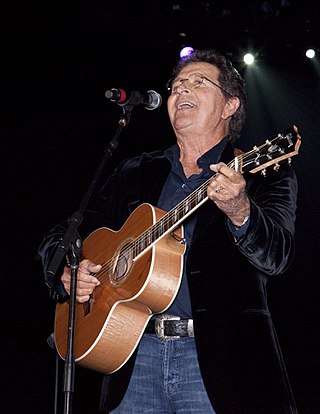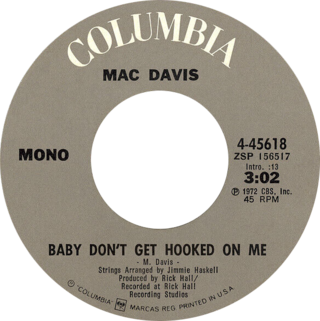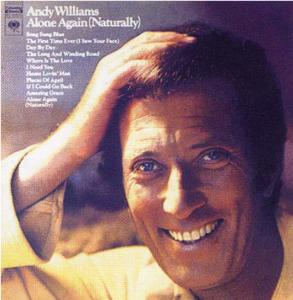
Carl Hilding "Doc" Severinsen is an American retired jazz trumpeter who led the NBC Orchestra on The Tonight Show Starring Johnny Carson.

Gilbert Jeremy Gottfried was an American stand-up comedian and actor, best known for his exaggerated shrill voice, strong New York accent, and his edgy, often controversial, sense of humor. His numerous roles in film and television include voicing Iago in Disney's Aladdin franchise, Mister Mxyzptlk in Superman: The Animated Series and Justice League Action, Digit LeBoid in PBS Kids' Cyberchase, Kraang and Subprime in Teenage Mutant Ninja Turtles and the Aflac duck. He also played Mr. Peabody in the Problem Child franchise.

Mac Davis was an American songwriter, singer, performer, and actor. A native of Lubbock, Texas, he enjoyed success as a crossover artist, and during his early career he wrote for Elvis Presley, providing him with the hits "Memories", "In the Ghetto", "Don't Cry Daddy", and "A Little Less Conversation". A subsequent solo career in the 1970s produced hits such as "Baby, Don't Get Hooked on Me". Davis also starred in his own variety show, a Broadway musical, and various films and TV shows.

"Medley: Aquarius/Let the Sunshine In " is a medley of two songs written for the 1967 musical Hair by James Rado and Gerome Ragni (lyrics), and Galt MacDermot (music), released as a single by American R&B group the 5th Dimension. The song spent six weeks at number one on the US Billboard Hot 100 pop singles chart in the spring of 1969 and was eventually certified platinum in the US by the RIAA. Instrumental backing was written by Bill Holman and provided by session musicians commonly known as the Wrecking Crew. The actual recording was novel at the time, being recorded in two cities, Los Angeles and Las Vegas, and being mixed down to a final version later.
Walter Anthony Murphy Jr. is an American composer, keyboardist, songwriter, and record producer. He is best known for the instrumental "A Fifth of Beethoven", a disco adaptation of Beethoven's Fifth Symphony which topped the charts in 1976 and was featured on the Saturday Night Fever soundtrack in 1977. Further classical-disco fusions followed, such as "Flight '76", "Toccata and Funk in 'D' Minor" "Bolero", and "Mostly Mozart", but were not as successful.
Country pop is a fusion genre of country music and pop music that was developed by members of the country genre out of a desire to reach a larger, mainstream audience. Country pop music blends genres like rock, pop, and country, continuing similar efforts that began in the late 1950s, known originally as the Nashville sound and later on as Countrypolitan. By the mid-1970s, many country artists were transitioning to the pop-country sound, which led to some records charting high on the mainstream top 40 and the Billboard country chart. In turn, many pop and easy listening artists crossed over to country charts during this time. After declining in popularity during the neotraditional movement of the 1980s, country pop had a comeback in the 1990s with a sound that drew more heavily on pop rock and adult contemporary. In the 2010s, country pop metamorphosized again with the addition of hip-hop beats and rap-style phrasing.
Frank Mills is a Canadian pianist and recording artist, best known for his solo instrumental hit "Music Box Dancer".
"Theme from A Summer Place" is a song with lyrics by Mack Discant and music by Max Steiner, written for the 1959 film A Summer Place, which starred Sandra Dee and Troy Donahue. It was recorded for the film as an instrumental by Hugo Winterhalter. Originally known as the "Molly and Johnny Theme", this lush extended cue, as orchestrated by Murray Cutter, is not the main title theme of the film, but an oft-heard secondary love theme for the characters played by Dee and Donahue. The theme has become a canonical representation of the easy listening genre, and is considered by some to be the definitive easy listening track of all time.

"Can't Get Used to Losing You" is a song written by Jerome "Doc" Pomus and Mort Shuman, first made popular by Andy Williams in a 1963 record release, which was a number-two hit in both the US and the UK. Twenty years later, British band the Beat took a reggae re-arrangement to number three in the UK.
"Chanson D'Amour" is a popular song written by Wayne Shanklin. A 1977 recording by The Manhattan Transfer was an international hit, reaching number one on the UK Singles Chart.

"Love Theme from The Godfather" is an instrumental theme from the 1972 film The Godfather, composed by Nino Rota. The piece was lyricized in English by Larry Kusik into "Speak Softly, Love", a popular song released in 1972. The highest-charting rendition of either version was by vocalist Andy Williams, who took "Speak Softly Love" to number 34 on Billboard magazine's Hot 100 and number seven on its Easy Listening chart.
"You're the Only World I Know" is a song written by Sonny James and Robert Tubert and performed by Sonny James.

"Baby Don't Get Hooked on Me" is a hit song by country and pop singer-songwriter Mac Davis. From his breakthrough album of the same name, the song reached No.1 on both the Billboard Hot 100 and Easy Listening charts in September 1972, spending three weeks atop each chart. Billboard ranked it as the No.8 song of 1972. Davis wrote it when the record company demanded he write a tune with a "hook".

"Roses Are Red (My Love)" is a popular song composed by Al Byron and Paul Evans. It was recorded by Bobby Vinton, backed by Robert Mersey and his Orchestra, in New York City in February 1962, and released in April 1962, and the song was his first hit.
"I've Gotta Be Me" is a popular song that appeared in the Broadway musical Golden Rainbow, which starred Steve Lawrence and Eydie Gormé. It opened in New York City at the Shubert Theatre on February 4, 1968, and closed just under a year later, on January 11, 1969. The music and lyrics for the musical were composed and written by Walter Marks in 1967; the production featured a book by Ernest Kinoy. This song was listed in the musical as "I've Got to Be Me" and, at the end of the first act, it was sung by Lawrence's character, Larry Davis. Lawrence released it as a single in 1967, and hit #6 on the Billboard Easy Listening chart the following year, with little or no support from traditional Top 40 radio.

"One Hell of a Woman" is a 1974 song by the American singer-songwriter Mac Davis. The song was written by Davis and Mark James.

"Watching Scotty Grow" is a song written by country music singer-songwriter Mac Davis and recorded by Bobby Goldsboro in 1970 on his album, We Gotta Start Lovin. Davis recorded his version on his 1971 album, I Believe in Music.

"Leave Me Alone " is a 1973 song written and first recorded by American singer-songwriter Linda Laurie. It was famously covered by Australian-American singer Helen Reddy several months later; Reddy's cover was a million-selling, Gold-certified hit single.

Days of Wine and Roses and Other TV Requests is the eleventh studio album by American pop singer Andy Williams and was released in April 1963 by Columbia Records following his first season as host of his variety series, The Andy Williams Show. The LP has a studio recording of the closing theme from the show, "May Each Day", and continues the format of his previous Columbia releases by including songs from the 1920s, 1930s, 1940s, and 1950s.

Alone Again (Naturally) is the thirtieth studio album by American pop singer Andy Williams, released in September 1972 by Columbia Records and mainly consisting of songs originated by other artists. For its release in the UK, the album was titled The First Time Ever (I Saw Your Face), and three of the songs were replaced with the 7-inch single tracks "Who Was It?" and "Marmalade, Molasses & Honey" and a recording that was not released on vinyl in the U.S., "If You're Gonna Break Another Heart".













